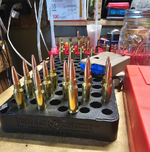Cold "welding", bullet to case neck bonding. I came upon this subject in another forum but want to hear opinions from those I know longer here. What happens is handloads somehow bond to the case neck over time, increasing chamber pressure when firing. A common solution is to lube the bullet in graphite before seating.
A quick web search shows only a few discussions, so this is indeed a topic if somewhat obscure. I'm trying to judge just how much of a concern it is?
reloading photo for attention:

A quick web search shows only a few discussions, so this is indeed a topic if somewhat obscure. I'm trying to judge just how much of a concern it is?
reloading photo for attention:

Last Edited:











